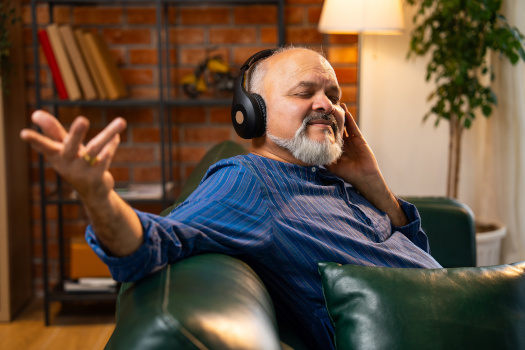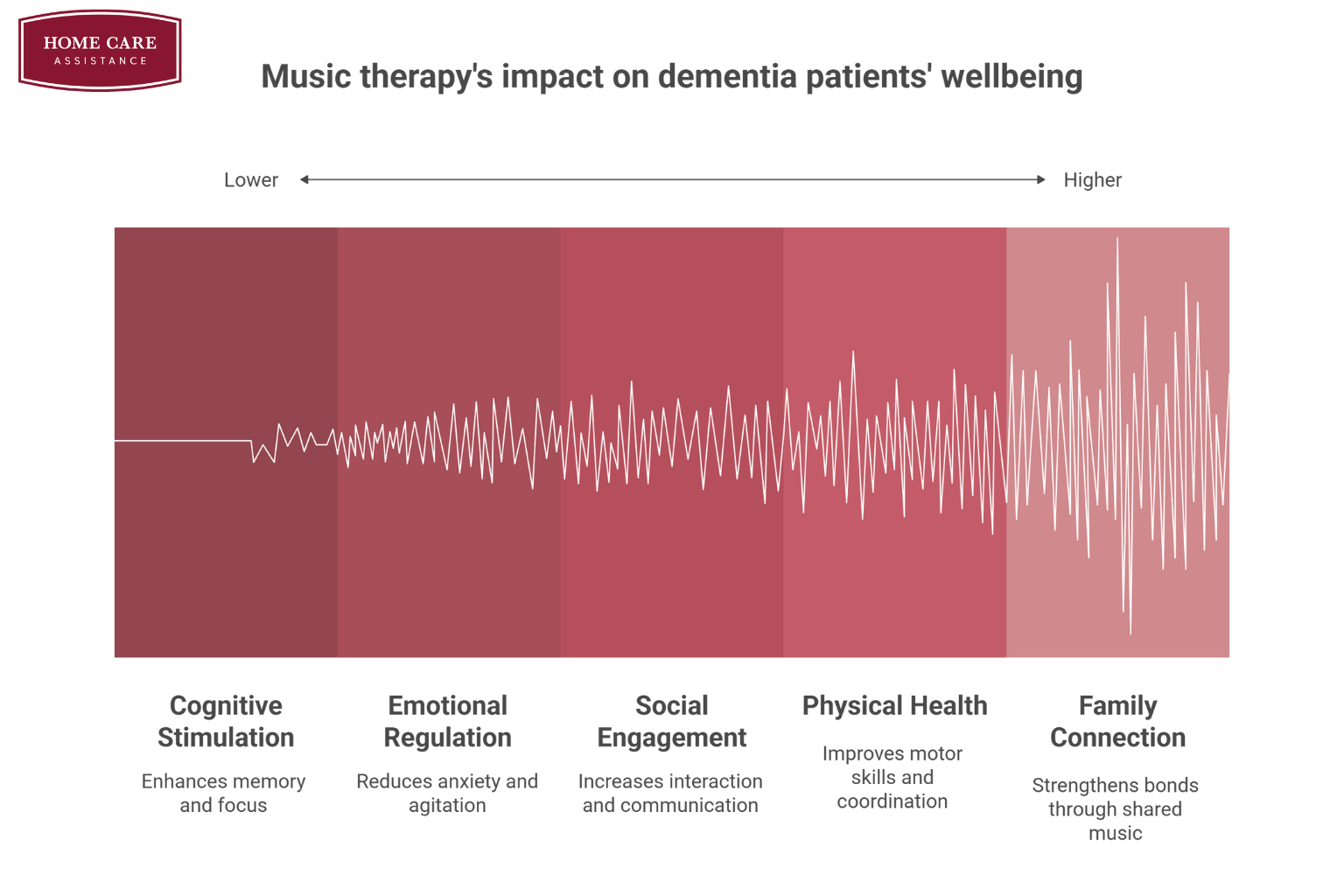
Music therapy has emerged as a powerful therapeutic intervention for people living with dementia, offering a pathway to connection when other forms of communication become challenging. This evidence-based treatment uses musical activities to address physical, emotional, cognitive, and social needs. Research consistently demonstrates that music therapy can significantly enhance quality of life for dementia patients while providing meaningful support for their families.
Cognitive Stimulation and Memory Enhancement
Music therapy activates multiple areas of the brain simultaneously, creating unique opportunities for cognitive engagement in people with dementia. Musical memories often remain intact even when other types of recall deteriorate, allowing dementia patients to access familiar songs and melodies from their past.
Key cognitive benefits include:
- Enhanced short-term memory during and immediately after music sessions
- Increased attention span and focus during musical activities
- Stimulation of neural pathways that support language and communication
- Activation of procedural memory through rhythm and melody recognition
Music therapists often incorporate personalized playlists featuring songs from dementia patients’ younger years, triggering autobiographical memories and encouraging storytelling. This approach helps them maintain cognitive connections while providing opportunities for meaningful interaction with family members and caregivers.
Engaging in music therapy is just one of the many ways older adults can boost their wellbeing. Maintaining a high quality of life can be challenging for some seniors, but professional caregivers can help them attain this goal. Families can trust senior home care experts to help their elderly loved ones focus on lifestyle choices that increase the chances of living longer and healthier lives.
Emotional Regulation and Mood Enhancement
Dementia frequently causes emotional distress, including anxiety, depression, and agitation. Music therapy provides a nonpharmacological approach to managing these challenging behaviours while promoting emotional wellbeing.
The emotional benefits of music therapy include:
- Reduced anxiety and stress levels during music sessions
- Decreased episodes of agitation and aggressive behaviour
- Better mood and increased expressions of joy
- Enhanced sense of accomplishment through musical participation
- Greater emotional connection with caregivers and family members
Live music sessions, whether individual or group based, create safe spaces for emotional expression. Seniors with dementia often respond positively to singing, playing instruments, or simply listening to carefully selected music that matches their emotional needs and preferences.
Social Engagement and Communication
As dementia progresses, social isolation often increases due to communication difficulties and behavioural changes. Music therapy sessions provide structured opportunities for social interaction and nonverbal communication when traditional conversation becomes challenging.
Social benefits include:
- Increased participation in group activities and community settings
- Increased eye contact and nonverbal communication with others
- Enhanced bonding experiences with family members through shared musical activities
- Reduced social withdrawal and increased willingness to engage
- Opportunities for self-expression through musical choices and participation
Group music therapy sessions encourage peer interaction and create a sense of community among participants. Family members can also participate in sessions, learning techniques to continue musical engagement at home and strengthen their relationships with loved ones living with dementia.
The type of at-home care Edmonton, AB, seniors need can vary. Some need assistance a few hours a day, while others require more extensive around-the-clock assistance. At Home Care Assistance, we tailor our care plans based on each senior’s individual care needs, and the plans can be adjusted at any time. We are a trusted provider of respite and 24-hour care, and we also offer specialized Alzheimer’s, dementia, Parkinson’s, and stroke care for seniors.
Physical Health and Motor Function Support
Music therapy addresses physical challenges associated with dementia by incorporating movement, rhythm, and coordination activities. These interventions can help seniors maintain motor skills and provide gentle physical exercise appropriate for various mobility levels.
Physical benefits include:
- Increased gait stability and walking patterns through rhythmic cues
- Enhanced coordination and motor skills
- Reduced muscle tension and promotion of relaxation
- Better sleep patterns following music therapy sessions
- Increased participation in physical rehabilitation exercises when combined with music
Rhythmic activities like drumming or clapping help seniors maintain hand-eye coordination, while movement to music encourages gentle exercise and can reduce the risk of falls. Music therapists work closely with other healthcare providers to ensure activities complement overall treatment goals and physical capabilities.
Family Communication and Connection
Music therapy creates unique opportunities for families to connect with their loved ones living with dementia. When integrated with effective family communication strategies, musical activities can become powerful tools for maintaining relationships and creating positive shared experiences.
Families can incorporate music therapy principles at home by:
- Creating personalized playlists featuring meaningful songs from different life periods
- Establishing regular music listening times as part of daily routines
- Encouraging singing or humming during care activities like bathing or dressing
- Using rhythm instruments for simple musical interactions
- Recording family members singing favourite songs for repeated listening
These musical interventions complement broader home care communication strategies by providing alternative ways to express love and maintain connections when verbal communication becomes difficult. Just as families benefit from clear communication about care decisions and role assignments, they also benefit from understanding how music can serve as a universal language for ongoing emotional connection.
Aging in place can present a few challenges for seniors living with dementia. However, they can still live independently at home with the help of professional dementia care. Edmonton families can rely on Home Care Assistance to provide their elderly loved ones with mental and social stimulation, timely medication reminders, assistance with meal prep, and much more. Our caregivers are available around the clock to help your loved one live a happier and healthier life. Home Care Assistance will work with you to customize a care plan that’s just right for your loved one’s needs. Call us today at (780) 490-7337 to discuss how we can give you the peace of mind that comes from knowing your loved one is being cared for with professionalism and compassion.
